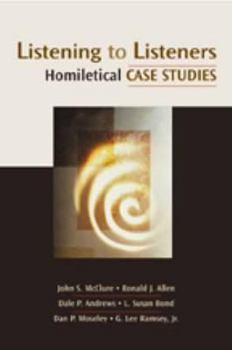Listening to Listeners: Homiletical Case Studies
Many preachers long to understand the dynamics of thought, feeling, and behavior at work in congregations. They use many techniques to evaluate the needs of their congregation and to sharpen their... This description may be from another edition of this product.
Format:Paperback
Language:English
ISBN:0827205007
ISBN13:9780827205000
Release Date:June 2004
Publisher:Chalice Press
Length:195 Pages
Weight:0.82 lbs.
Dimensions:0.6" x 5.9" x 8.6"
Customer Reviews
1 rating
Do you hear what I hear?
Published by Thriftbooks.com User , 20 years ago
This book is part of a four-volume series of homiletical (preaching) resources designed to aid those who preach understand more about the way their sermons are heard and understood. A team of noted scholars in the field of homiletics from several divinity schools and seminaries (including my own) worked together on this volume, and through sponsorship of the Lilly Endowment, brought together a diverse group of people from 28 area congregations to be part of the study. The purpose of this study, this volume and the others forthcoming, could be formed out of the statement in the preface to this volume, which the scholar team said to the congregation members -- 'Teach us how you listen to sermons so that we can help ministers become more effective preachers.' This volume looks in detail at six particular interviews in that process, adopting a case study approach, five individuals and one small group of another five persons. These were selected as part of the overall group representative of many levels of diversity, along gender, racial, and geographic location lines. After describing briefly some procedural matters in the first chapter, the writers for this volume each took one chapter with an individual, or in Ron Allen's case in the final of these chapters, with the small group. The pattern for each chapter is the same -- a brief introduction of the person or group, some basic demographics about the church and community, and then a transcript of the interview itself. The interview transcript is set in double-column format with interview observations and links to the overall questions and themes throughout. Finally, each interview ends with a brief analysis of the Listening for Preaching, Listening for Theology, and the particular challenges brought out by the experiences of that individual's response. After the interview sections, there are two chapters and an epilogue that discuss important issues -- chapter 8 looks at particular insights arising out of these experiences, which range from realisations of the importance of the community context to understanding that the several-thousand-year-old rhetoric ideas of Aristotle still ring true in many ways. Particularly with the small group session, but also in the individual interviews, the idea of the importance of community rises over and over. The authors present a chapter on approaches to interviewing congregations -- perhaps this is a warning label type of chapter, 'kids, don't try this at home'. It is no simple matter to take a list of questions and begin asking people in a congregation, and the minister who would do this on her or his own is likely to end up creating unexpected problems. However, there are things that ministers can and should do to get in touch with their congregations, recognising that there is no normative or standard congregation against which their would be measured; the epilogue continues this idea with 'a confirmation, a caution and a call'. The caution





